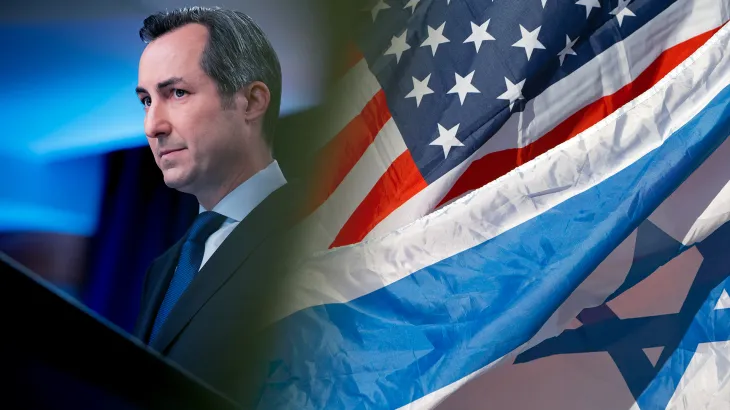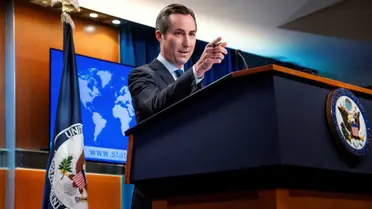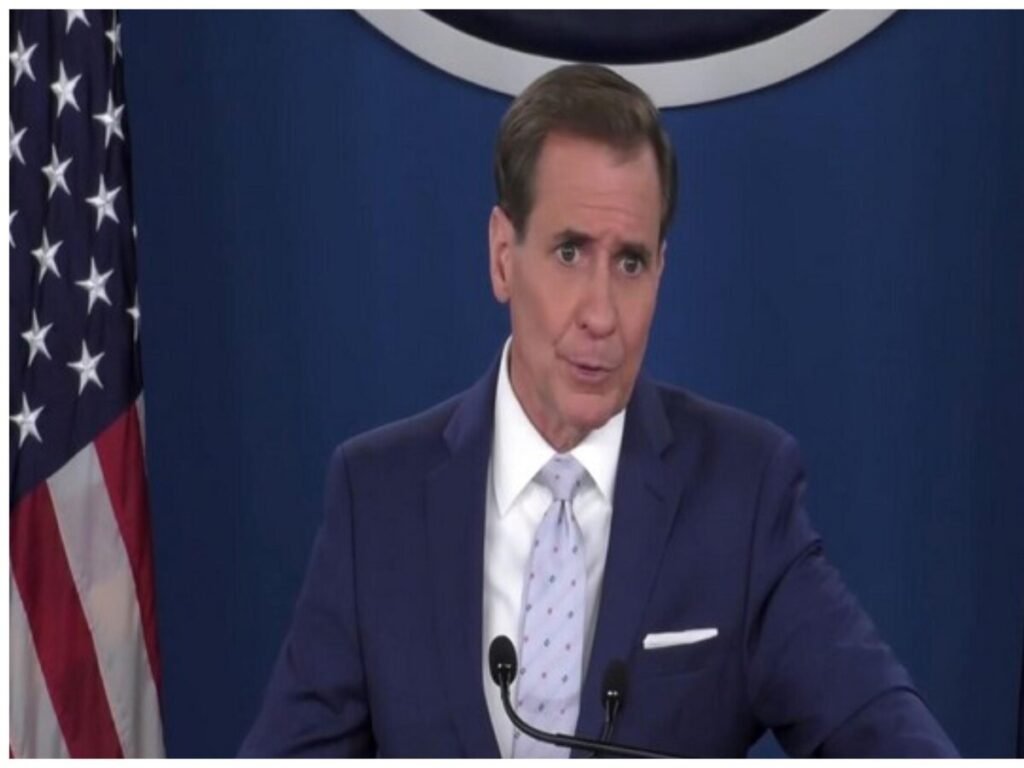
Diplomatic Backing and Veto Power
The United States has consistently provided robust diplomatic support to Israel. Often using its veto power as a permanent member of the United Nations Security Council. To shield its ally from potential sanctions. This strategic use of veto power is a critical tool in the U.S.’s foreign policy arsenal. Reflecting its commitment to safeguarding Israel’s interests on the global stage. By blocking resolutions that may pose economic or political challenges to Israel, the U.S. Not only reinforces its bilateral ties with Israel but also shapes the broader narrative around Middle Eastern geopolitics. Furthermore, this approach serves as a clear signal to other nations about the U.S.’s stance. And its readiness to use significant diplomatic resources to maintain this position. Protect Israel
Strategic Alliances and Political Leverage Protect Israel
Beyond the use of veto power, the US State Department fosters strong strategic alliances. That indirectly assist in protecting Israel from international censure. Through intricate networking and diplomacy, the U.S. cultivates relationships that prioritize mutual interests. Including regional stability and security concerns that often align with Israeli policies. These alliances are bolstered by extensive aid packages and defense cooperation, which not only fortify Israel’s security apparatus. But also bind key countries to Israel’s geopolitical narrative. As a result, the U.S. leverages these relationships to mitigate against potential sanctions by ensuring a coalition of supportive states. That can influence decisions at international forums, effectively diluting opposition.
Impact on International Law and Norms Protect Israel
The U.S. State Department’s strategies in protecting Israel from sanctions also have profound. Implications on international law and the enforcement of global norms. By frequently shielding Israel, the U.S. potentially sets precedents that complicate the application of international law uniformly. Leading to debates about the fairness and impartiality of international governance systems. Critics argue that such actions undermine the credibility of international bodies like the United Nations. While supporters believe that U.S. actions are necessary to maintain geopolitical balance and protect its strategic interests. This ongoing tension reflects the complex interplay between national interests and global justice. Highlighting the challenges in balancing these aspects in international relations.
The Role of Economic Leverage in US-Israel Relations
The United States employs economic leverage as a significant means of shielding Israel from international sanctions. Demonstrating its profound commitment to ensuring Israel’s stability and security. This economic support is not just in the form of direct aid. It extends to ensuring that Israel benefits from favorable trade agreements and joint projects that bolster its economy. Additionally, the U.S. actively discourages other nations from engaging in boycotts or imposing trade barriers. Against Israel through both diplomatic channels and by making use of powerful lobbying efforts. This practice reinforces Israel’s economic resilience against potential sanctions or economic isolation.

Furthermore, the impact of such economic policies extends beyond immediate financial benefits to Israel. By integrating Israel into global markets and protecting its trade interests, the U.S. enhances Israel’s diplomatic ties with other countries. Making it costly for other nations to support sanctions against Israel. The strategic use of economic influence thus serves as a deterrent against potential sanctions. Maintaining Israel’s economic stability and international relations. Moreover, this economic interconnectedness introduces complexities in international politics. Where countries may find their hands tied, unable to support sanctions without risking their own economic interests.
Influencing Public and International Opinion Protect Israel
In addition to using direct political and economic tools, the U.S. State Department plays a crucial role in shaping public and international opinion regarding Israel. Through comprehensive public diplomacy efforts, the U.S. promotes narratives that emphasize Israel’s right to security. And its stance against terrorism, which resonate with many on the international stage. These efforts are amplified by sophisticated media strategies that highlight Israel’s contributions to technology. And global security, thereby fostering a positive image of Israel worldwide.
Moreover, the U.S. often counters negative portrayals of Israel in international forums and discussions. Using its diplomatic channels to influence how Israel is perceived globally. This strategic management of information helps mitigate against the rise of international sentiment. That could lead to sanctions, ensuring that Israel is viewed favorably in the eyes of many nations. The challenge, however, lies in balancing these narratives with the need to address legitimate international concerns. About Israel’s policies, particularly in relation to the Palestinian territories. The U.S.’s ability to maintain this balance significantly affects its credibility and the effectiveness of its foreign policy.
Long-Term Implications for Global Diplomacy
The U.S.’s steadfast efforts to protect Israel from sanctions have significant long-term implications for global diplomacy and international law. By consistently vetoing UN resolutions against Israel, the U.S. not only affects the immediate geopolitical dynamics but also raises questions about the impartiality and effectiveness of international governing bodies like the United Nations. This situation creates a precedent that might encourage other countries to bypass UN mandates they disagree with, potentially undermining the global rule of law and the United Nations’ authority.
Additionally, such actions may lead to a polarization in international relations, where countries are forced to choose sides based on strategic interests rather than diplomatic principles. This division can hinder global cooperation on a range of issues, from security to environmental policies. The challenge for the U.S. going forward will be to navigate these complex waters without sacrificing global governance and international norms, ensuring that its foreign policy achieves the desired security outcomes without diminishing the role of international law and cooperative diplomacy.
Navigating the Ethical Landscape in International Relations
The United States’ approach to shielding Israel from international sanctions also brings to the forefront the ethical dilemmas inherent in global politics. While the U.S. justifies its actions by highlighting Israel’s strategic importance and its right to defend itself, this stance is often met with criticism regarding the broader implications for justice and fairness in international relations. Critics argue that this unilateral support can complicate peace efforts and exacerbate regional conflicts, especially in the context of the Israeli-Palestinian conflict. This dichotomy between strategic interests and ethical considerations poses a significant challenge for U.S. foreign policy, balancing its global leadership role with its national interests.
Furthermore, this approach raises questions about the consistency of U.S. foreign policy, particularly in relation to its stance on human rights and international law. While the U.S. advocates for human rights and compliance with international norms in other regions, its protective stance towards Israel can seem contradictory when contentious issues such as settlements and military actions in civilian areas are considered. This perceived double standard complicates the U.S.’s ability to effectively champion global human rights and can diminish its moral authority on the international stage, potentially impacting its relations with other nations and international bodies.

Strengthening Bilateral Relations through Strategic Support
Beyond the immediate realm of shielding Israel from sanctions, the U.S.’s actions are deeply intertwined with efforts to strengthen bilateral relations between the two nations. This support is not merely manifested through diplomatic shields but also through extensive military aid and cooperative defense projects. Such strategic support serves multiple purposes: it bolsters Israel’s military capabilities, ensuring its regional security, and deepens the ties that bind the U.S. and Israel together. The collaboration extends into intelligence sharing, joint military exercises, and development of cutting-edge defense technology, activities that cement the partnership and align strategic objectives.
This robust partnership benefits the U.S. by providing a steadfast ally in a volatile region, contributing to a security architecture that supports American interests in the Middle East. However, it also obligates the U.S. to consider Israel’s viewpoints and positions in its regional policies more broadly, sometimes at the expense of relationships with other nations. As such, the U.S. must navigate complex diplomatic waters, promoting peace and stability while supporting Israel, thus attempting to maintain a balanced approach in a region where balances shift frequently.
The Future of U.S.-Israel Dynamics in Changing Global Contexts
Looking ahead, the dynamics of U.S. support for Israel are likely to evolve as global and regional political landscapes change. The rise of multipolar world dynamics, with increasing influence from other global powers like China and Russia, challenges the traditional axes of power and might prompt shifts in U.S. strategies. Additionally, growing public and political scrutiny within the U.S. regarding its foreign aid and international alliances could lead to more nuanced positions on issues like sanctions and international accountability.
As future administrations assess their foreign policy priorities, the U.S.-Israel relationship may undergo transformations that could either strengthen this bond or lead to a more calculated repositioning. This potential shift will depend on a myriad of factors, including domestic political pressures, international diplomatic developments, and evolving security challenges. How the U.S. navigates these changes will significantly impact its ability to influence outcomes in the Middle East and maintain its global stature as a leader in international diplomacy.
In sum, the relationship between the U.S. and Israel, particularly in the context of shielding Israel from sanctions, is a multifaceted issue that encompasses strategic, ethical, and diplomatic dimensions. This relationship not only shapes the geopolitical landscape of the Middle East but also influences broader international norms and the global perception of U.S. foreign policy. As new challenges arise, the resilience and adaptability of this alliance will be tested, shaping future international alignments and policies. Protect Israel
Inspired by Al-Jazeera News and read more Articles Here, Read Previous Also